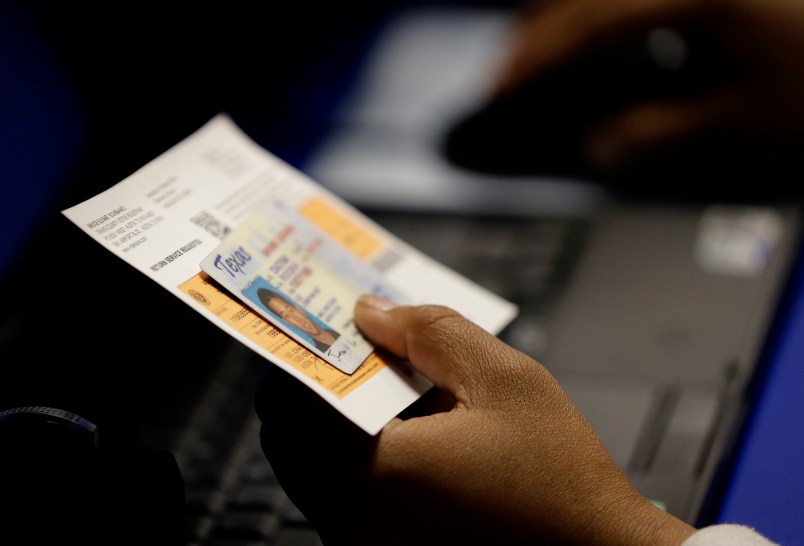A federal court in Texas Monday found that the state’s voter ID law was passed in 2011 with the intent to discriminate against minority voters. The ruling comes after the law was repeatedly found to have the effect of discriminating against minority voters, but it has been sent back to the district court by the 5th U.S. Circuit Court of Appeals to assess the intent claims with a higher legal standard.
“Because the Fifth Circuit found that some of the evidence in this case was not probative of a discriminatory purpose in the Texas Legislature’s enactment of SB 14, this Court was tasked with re-examining its conclusion on the discriminatory purpose issue,” the opinion, written by U.S. District Judge Nelva Gonzales Ramos, said. “Upon reconsideration and a re-weighing of the evidence in conformity with the Fifth Circuit’s opinion, the Court holds that the evidence found ‘infirm’ did not tip the scales.”
A discriminatory intent ruling risks Texas being placed under the so-called pre-clearance scheme of the Voting Rights Act, meaning that the state would have to get any changes to its voting protocols cleared by the federal government. Texas was previously covered under pre-clearance until the 2013 Supreme Court decision Shelby County v. Holder gutted a provision of the law.
After Texas’s GOP legislature passed the law in 2011, it was blocked by both the Department of Justice and a Washington, D.C.-based federal court, the two routes Texas had in getting an election policy federally-approved under the pre-Shelby VRA scheme. Once the Supreme Court gutted the VRA the formula that placed Texas and other states with histories of racially discriminatory voting practices under pre-clearance, Texas was able to implement to law, and was then sued by civil rights groups in 2013 who claimed it violated the Voting Rights Act as well as the Constitution.
The Department of Justice, under President Obama, was also involved in the lawsuit.
The district court in 2014 initially found it to be a constitutional violation, a poll tax, and a Voting Rights violation in both intent and effect. Texas appealed the ruling to the 5th Circuit, where after a 3-judge panel upheld at least some of the district court’s finding, the full appeals court also said last July that it had a discriminatory effect.
Monday’s ruling comes after the 5th Circuit asked the district court to use a more narrow framework to assess the evidence in regards to the intent claims.
Judge Gonzales Ramos said that even in that rubric, the burden was on the state to prove that the law had not been passed with a discriminatory intent and that Texas “has not met its burden.”
The judge pointed to “evidence of a pattern, unexplainable on grounds other than race,” such as changes to the law rejected by the Texas legislature that would have blunted the disproportionate effect the law had on minority voters.
“For instance, amendments were proposed to allow additional types of photo identification, a more liberal policy on expired documents, easier voter registration procedures, reduced costs for obtaining necessary ID, and more voter education regarding the requirements,” she said.
She also highlighted the “radical departures from normal practices” that Texas took in passing the law, as well as the lack of evidence of the types of voter fraud the law’s supporters said it would address.
“As previously demonstrated, the evidence shows a tenuous relationship between those rationales and the actual terms of the bill,” the opinions said, later adding that, for instance, the “bill did nothing to address mail-in balloting, which is much more vulnerable to fraud.”
Over the course of a legal battle that has lasted half a decade, Texas has shown a determination to fight tooth-and-nail in defense of its law. It’s likely that it will no longer be fighting against the Department of Justice under President Trump, as Attorney General Jeff Sessions is a proponent of voter ID laws and has expressed skepticism toward the Voting Rights Act. Trump’s DOJ had already shown signs that it would change its posture towards voting restrictions like the one passed in Texas with its attempt in January to delay the district court proceedings in this case.
Read the full opinion below:







When all is said and done, and the dust has settled I wonder if some nice wonk would crunch the numbers and tell us how much money the state of Texas has spent to deny the franchise to certain citizens? And also how much this fight has cost per resident of Texas.
Woo Hoo!
Yes yes yes!
Alas, Gorsuch was sworn in today so an appeal to the Supreme Court should make this victory short lived.
You know, you don’t know what the SCOTUS will do.
It’s been held discriminatory twice.
But thanks for the cold water anyway - I got to enjoy this for about 5 minutes.
Kennedy is still there, and Kennedy has ruled against Texas in the past. Many times. Gorsuch’s elevation does not change the balance of the court.